Tuesday Triage - Tuesday Triage #128
TUESDAY TRIAGE #128
by Vadim Drobinin
Your weekly crème de la crème of the Internet is here!
27.12.2022 (read in browser)
-
Intro
Whatever is on my mind this week. -
Things I enjoyed reading
Ten-ish articles I found worth reading. -
Things I didn't know last Tuesday
Ten-ish facts I didn't know when I wrote the previous edition. -
Book of the week
Some thoughts on the latest book I've read.
This is the 128th edition of the newsletter, and as I mentioned recently while most of emails now require a paid subscription, once a month I will be sending out a free edition – this is it.
If you'd like to receive this newsletter every week, as well as get access to an archive of all previous free and paid editions, you can do it here.
Since the previous email you've missed three newsletters mostly revolving around my journey through the Highlands:
- #125 on the road, where I make an overly complicated birthday cake, understand bubbles in coffee, and re-read Master and Margarita.
- #126 on wilderness, where I forage lingonberries, juniper, and chanterelles, learn about short snorters, and explore ways to dry meat.
- #127 on returning from the North, where I appreciate Scottish haute cuisine, delve into GPT-3 architecture, and try to understand how manual treadmills work.
On holidays
There are still a few days left till the end of the year, so I will leave my annual summary out of this edition, but as the holidays are already in full swing I mostly cook, and given that almost nothing distracts me from running around the kitchen, I cook things that I've been postponing for nearly a year.
I don't like the word "goals" but one of things I wanted to focus on in 2022 was a better grasp on wood-to-table dishes. Buying butchered game is fine, but there must a completely different flair to it when you actually have to pluck and dress it yourself, which is what we've started with by getting two male pheasants, two female pheasants, and four partridges:
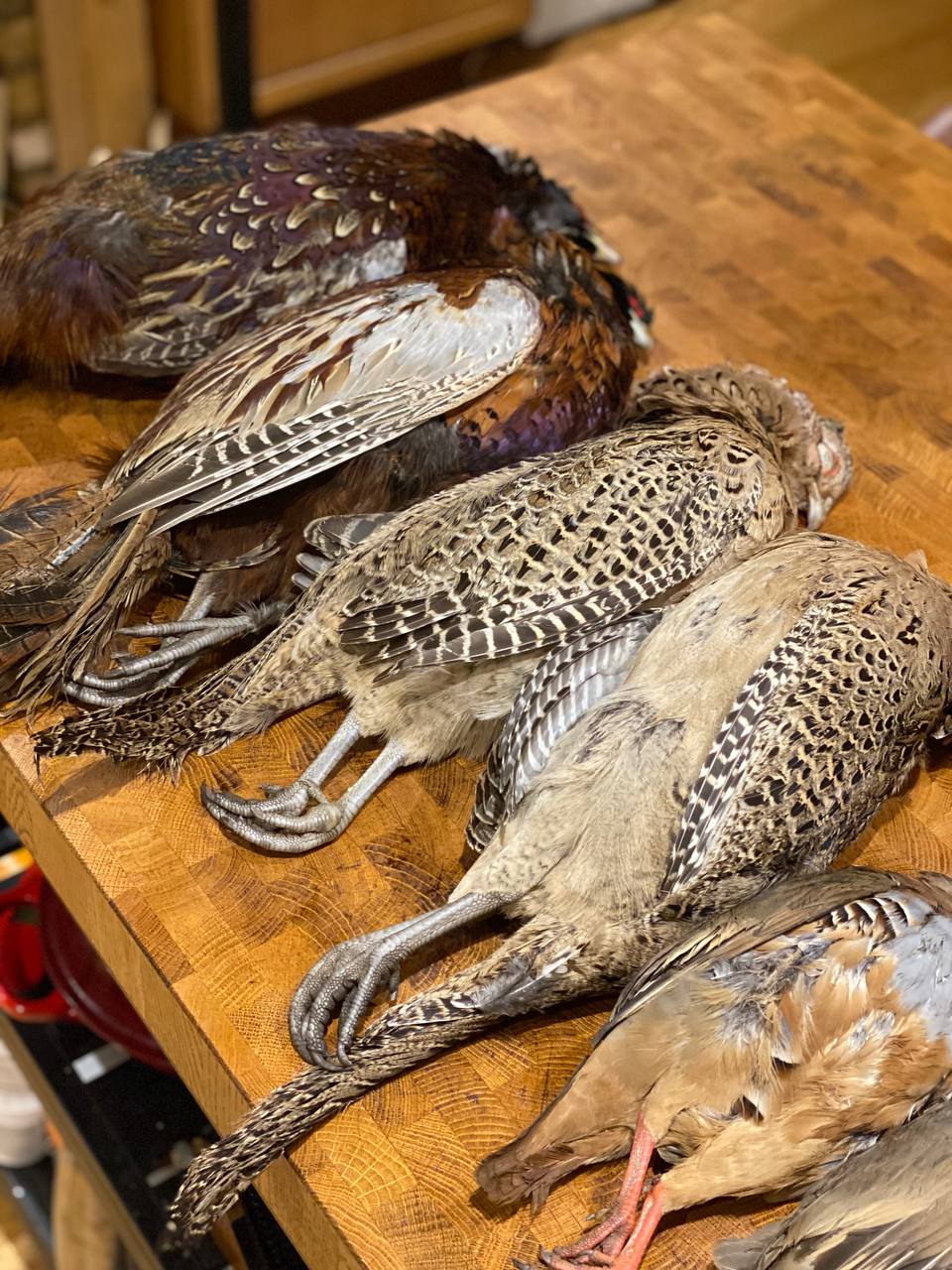
The birds were plucked and gutted, and I cooked some of them in sous vide first (62ºC for thighs and legs, 55ºC for breasts). It turned out alright, but not exceptional, and probably wasn't worth the effort. Next, we've separated all carcasses to make stock, and the rest of the meat went into a casserole: essentially a coq au vin blanc, but with pheasants and partridges.
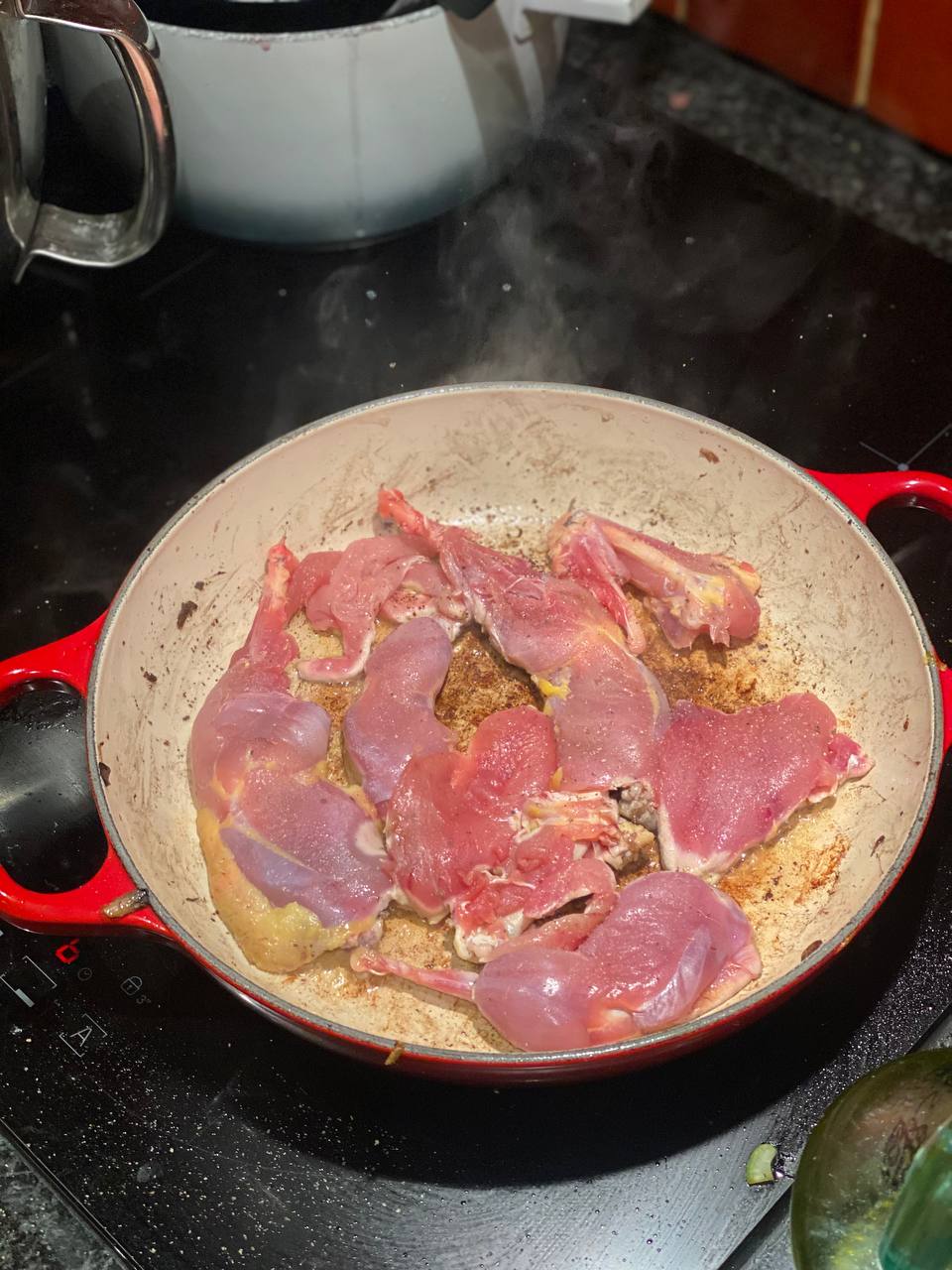
Turned out quite good, probably might add some cream to it later. It also jellified over night into some kind of aspic, so there is definitely lots of potential in there.
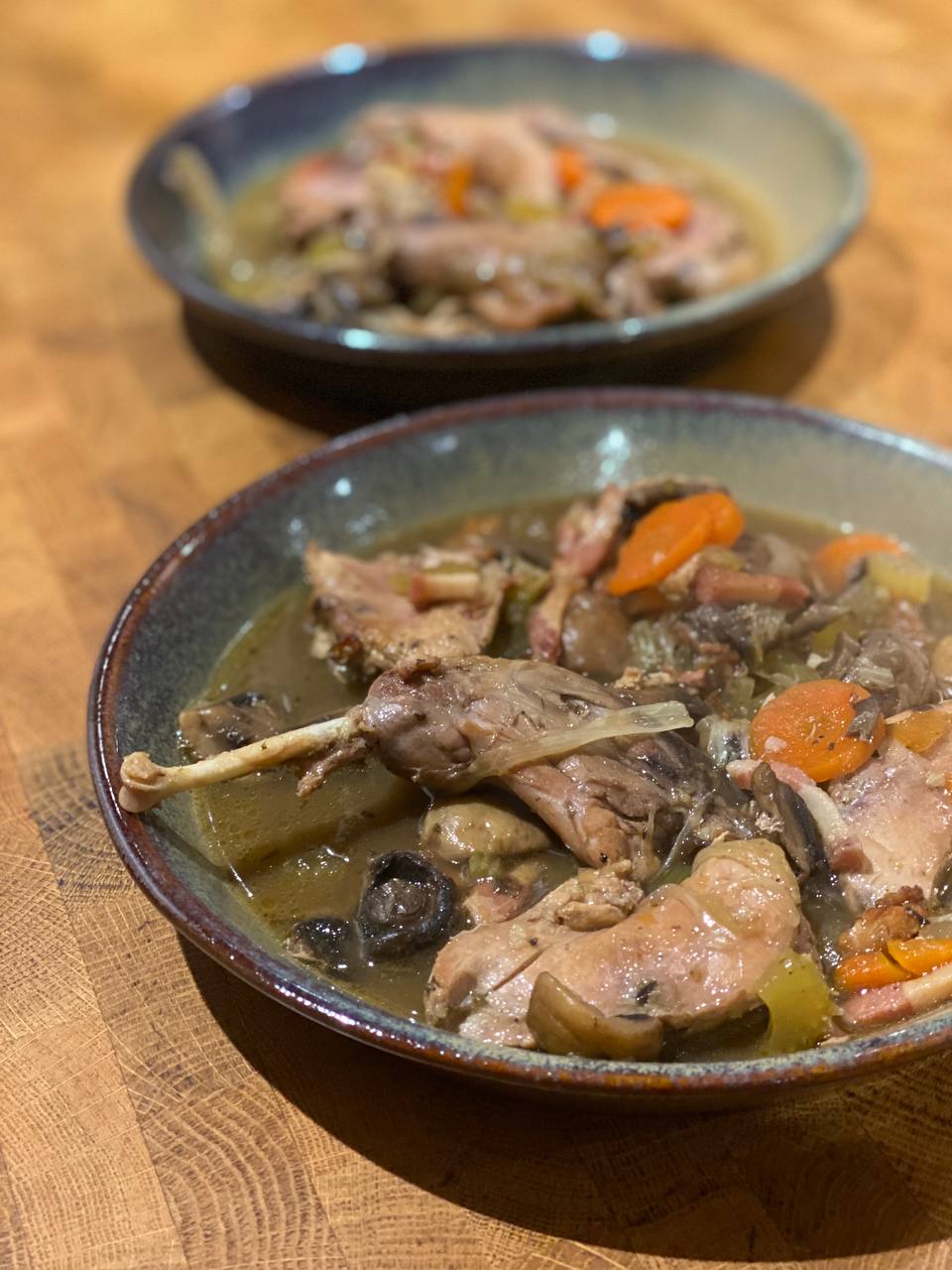
I also took the leftovers from sous vide birds, removed all the bones (they went into another stock), made a sauce with roux, ice cider, and stock, and then mixed everything together in a pan and sprinkled with fried guanciale.
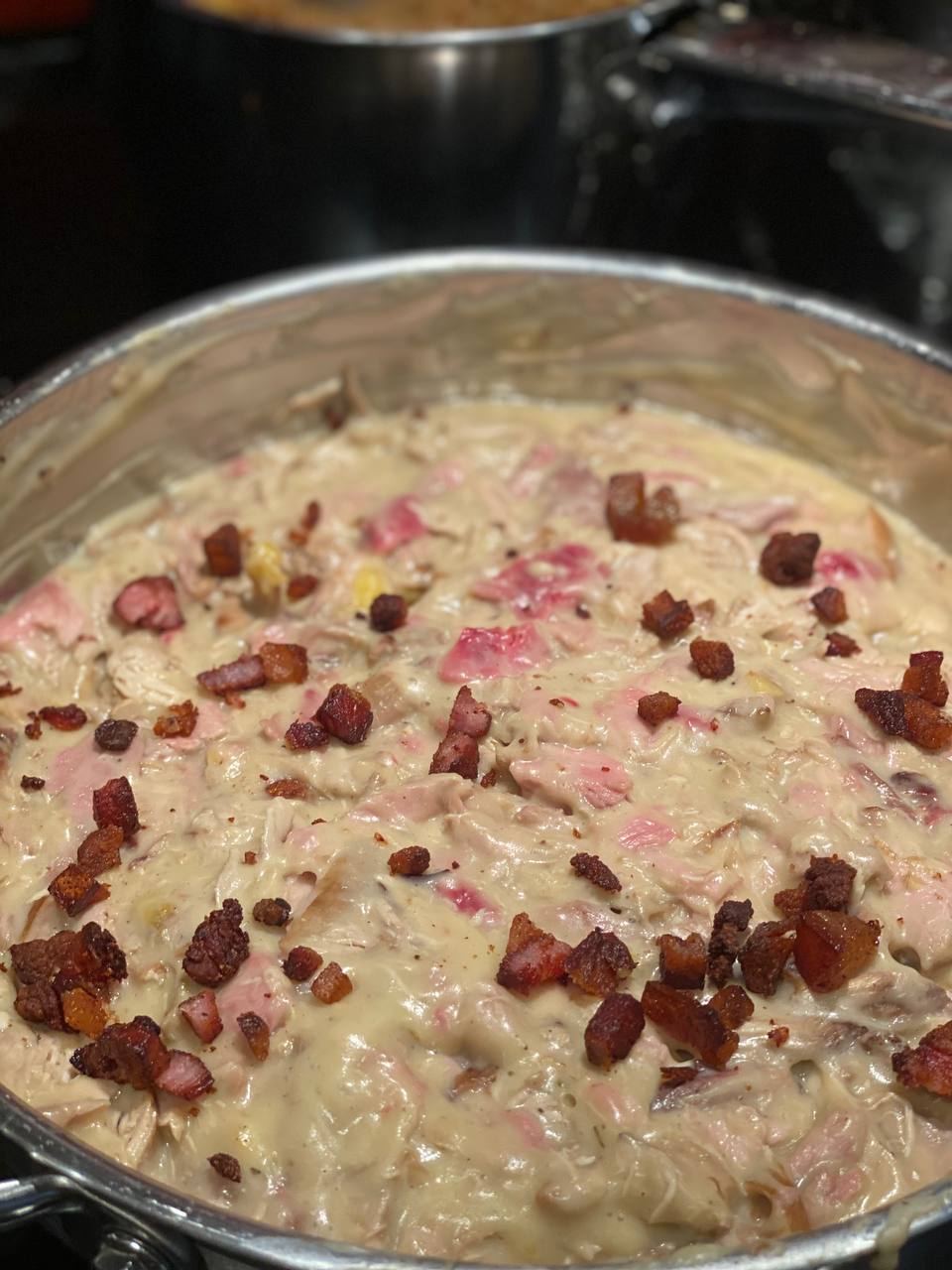
The mix was garnished with buttered breadcrumbs and blue cheese as a riff on some kind of game pie.
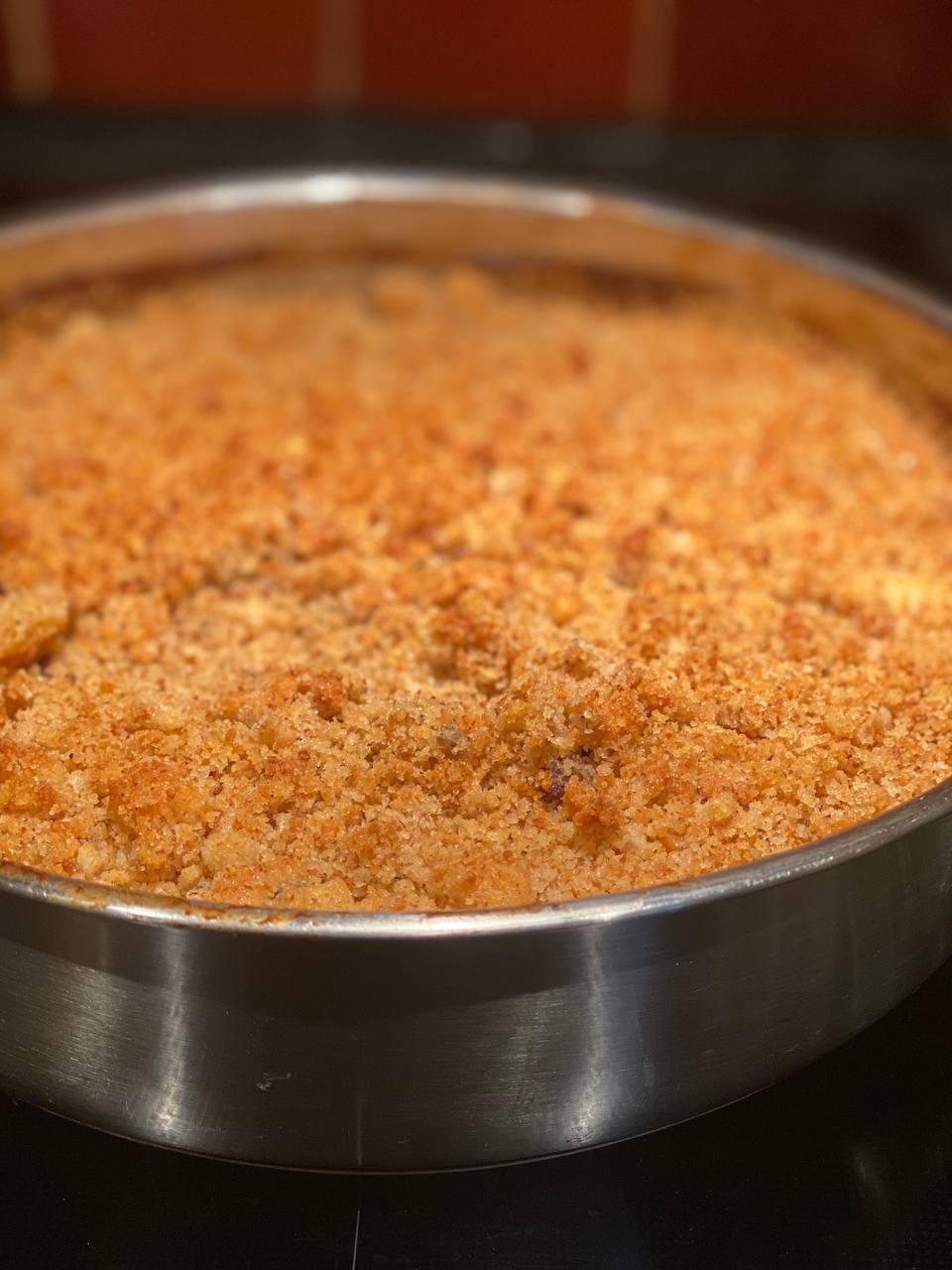
We also had some friends over and this year's appetizers were among my favourite to serve to a crowd. These beet slices were dehydrated into small shells:
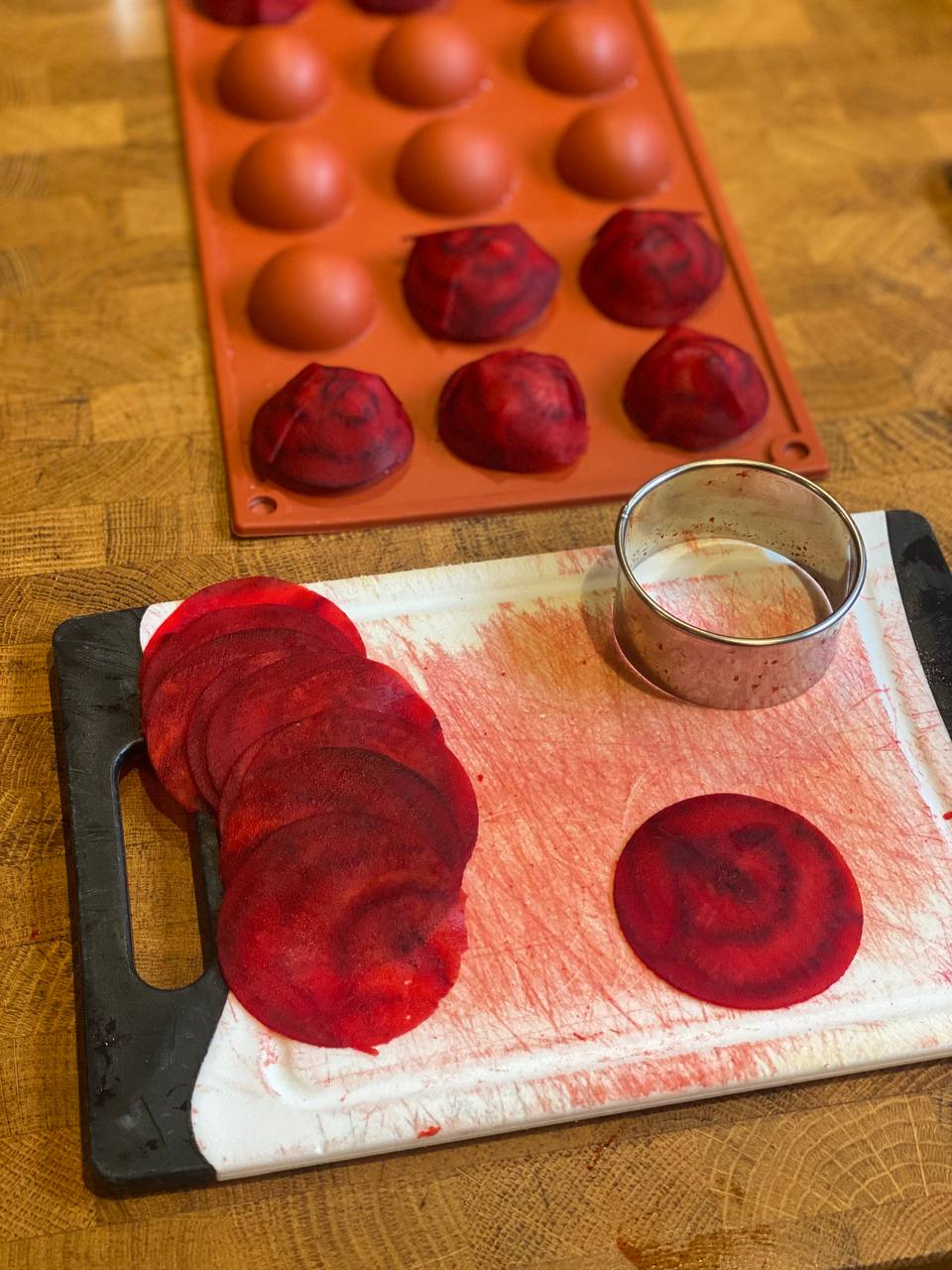
And then filled with pickled beets, salted cucumbers, dill mayonaisse and herring caviar in a riff on Dressed Herring salad:
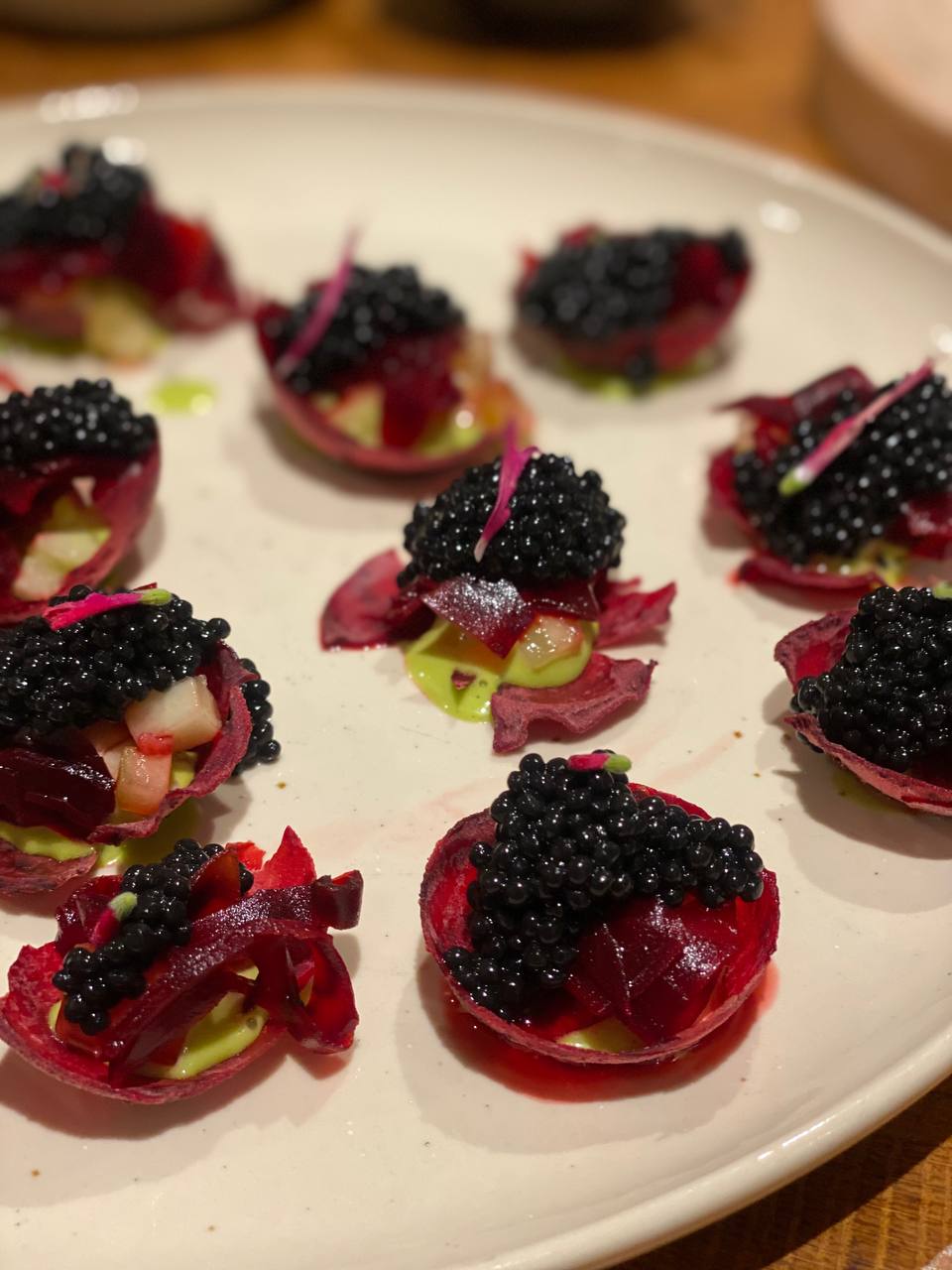
And these oysters with buttermilk and dill oil were heavily inspired by the ones we had a few weeks ago in Edinburgh.
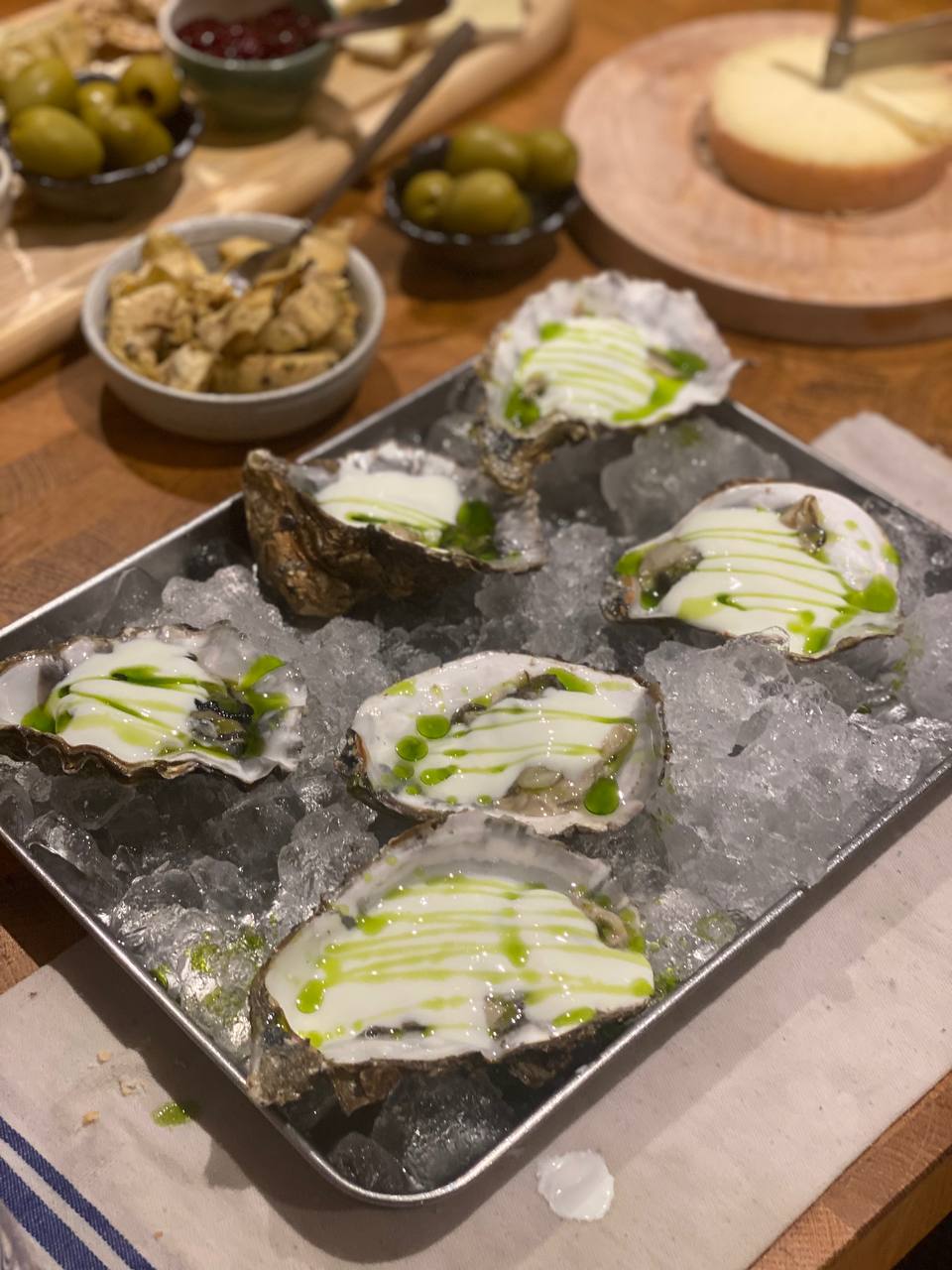
There are a few more fun dishes in the making but that's a topic for the next year.
See you in 2023?
Things I enjoyed reading
1. Are super-rich people just better at making money? by pudding.cool
Some great interactive and mildly positive article on how money saving (and the market in general) works.
If you play enough rounds, both players will win about half the games. But the poorer player will lose most of their money.
Meanwhile, the richer player will gain money. That's because, from their perspective, every game they lose means they have an opportunity to win it back – and then some – in the next coin flip. Every game they win means, no matter what happens in the next coin flip, they'll still be at a net-plus.
Repeat this process millions of times with millions of people, and you're left with one very rich person.
Probably nothing there is a secret, but every time I come across posts in the same spirit as the one above I think that it'd be nice to get richer, not come up with a more fair system.
2. Secrets of the Christmas Tree Trade by Owen Long
'tis the season to be jolly, and what could be even more festive than a holiday story that reads like a plot of an action movie?
Even still, I can’t help but think about Christmas, the holiday that has been my daily reality for two years. I’ve worked spring, summer, fall, and winter for Santa Claus — or, rather, for a man who looks exactly like Santa Claus, and possibly thinks he is Santa Claus, and is, fittingly, one of the top sellers of Christmas trees in New York City.
I don't know whyy, but most of similar stories takes place in New York. Is it that NYC is the place to be, or just there are so many journalists that eventually they produce enough content to find real gems in?
3. The price of ‘sugar free’: are sweeteners as harmless as we thought?artificial-sweeteners-price-of-sugar-free-are-they-as-harmless-as-we-thought by Bee Wilson
I am not a huge fan of dieting, but probably one of the very few things I've started to do recently is drinking 0 kcal soda. I hardly tell it apart by the taste, and there is a noticeable amount of calories to save if you have a few during the day.
Contrary to the claims so often made for them, the researchers found consistent evidence that consuming a lot of sweeteners was associated with an increased risk of type 2 diabetes (as well as higher risk of heart disease). Similarly, when it came to weight, they found that people who consumed a lot of sweeteners were more likely to gain weight over the long term (though the report also noted that short-term studies, lasting three months or less, showed that switching from sugary drinks to artificially sweetened ones resulted in modest weight loss of 0.71kg).
Seems like drinking too much Coke Zero might be a bad idea anyway, even though I've seen other researchers questioning whether the weight loss is related to 0 kcal drinks simply because obese people tend to drink Diet Coke for a bunch of other reasons.
4. Horror stories of cryonics by Tom Hartsfield
Back in my childhood I thought that freezing something hoping to defrost them in a few centuries is a really smart idea. These days I am not so sure, than,s to a plenty of sci-fi movies showing how hard would it be to live 50 or 100 years later.
Out of all those frozen prior to 1973, one body remains preserved. Robert Bedford was sealed into a Dewar in 1967. Instead of leaving the body to meet a horrific fate under Nelson’s care, Bedford’s family took custody of the capsule, meticulously caring for it at their own expense. The body was handed off between professional cryonics operations, occupying multiple frozen tanks and facilities for 15 years or so. Eventually it ended up in the hands of the founders of Alcor — a modern cryonics outfit — one of whom wrote a heartfelt, slightly creepy piece about the body.
Seems like another huge issue with cryonics is that the only reliable way to maintan the state of the person is to take care of the chamber yourselves, as otherwise they easily break.
5. The History of How School Buses Became Yellow by Bryan Greene
I am yet to see a proper yellow school bus in person but I've seen enough movies to understand how common those are in the States. I never thought about the reason behind their colour but now as I think about it, it makes sense:
Like London’s antiquated black cabs and ungainly double-decker buses, America’s yellow school buses have endured while so many other forms of transportation have seen dramatic changes. That’s due, in large part, to the school bus's astonishing record on safety. Cyr said, “The most often asked question [during the 1939 conference] was, ‘Will this standard improve safety?’” School-bus color was just one of 44 standards the conferees voted on in 1939. Others included “body lengths, ceiling heights, door specifications, and aisle widths.”
It's also a huge change driven by one person, and makes for a great long read.
6. People Took Some Potassium and Lost Some Weight by slimemoldtimemold
I shared an article on potato diet quite some time ago, and the same people dcided to go further and now look into another weight-loosing way.
We found this interesting, so we included a question about appetite changes in the followup survey. In these data, the majority of people reported no change to their appetite, but about a third reported decreased appetite, and six people reported greatly decreased appetite. Only one person reported any amount of increased appetite.
Most likely potassium intake affects the appetite as it works as an electrolyte, but there are no conclusions of the research yet.
7. No antibiotics worked, so this woman turned to a natural enemy of bacteria to save her husband’s lifephage-superbug-killer-life-itself-wellness/index.html by Sandee LaMotte,
A really inspiring story about a woman who changed the medical field while saving her husband.
Then she convinced phage scientists around the country to hunt and peck through molecular haystacks of sewage, bogs, ponds, the bilge of boats and other prime breeding grounds for bacteria and their viral opponents. The impossible goal: quickly find the few, exquisitely unique phages capable of fighting a specific strain of antibiotic-resistant bacteria literally eating her husband alive.
The disease that was a culprit in the first place sounds really dangerous as well, so here is one more unlocked fear for me.
8. Why do bees die when they sting you? by @subanima_
A good example of how differently one could ask or answer a question.
In both cases, the suicidal nature of neutrophils and that of worker bees benefit the bigger entity that surrounds them. For worker bees, their death may save the colony from Winnie the Pooh, and the death of Neutrophils may save you from dying from a bacterial infection.
Also a really good explanation of mechanics of the process... which didn't really make me afraid of bees less.
9. Solving grammar’s greatest puzzle by Tom Almeroth-Williams
Natural Language Processing in particular and computational linguistics in general are very popular nowadays and for many researchers "teaching" a machine a new language is a required step on the way to building more complex models.
While researching for his PhD thesis, published on 15th December 2022, Dr Rajpopat decoded a 2,500 year old algorithm which makes it possible, for the first time, to accurately use Pāṇini’s ‘language machine’.
Pāṇini’s system – 4,000 rules detailed in his renowned work, the Aṣṭādhyāyī, which is thought to have been written around 500BC – is meant to work like a machine. Feed in the base and suffix of a word and it should turn them into grammatically correct words and sentences through a step-by-step process.
This discovery will allow engineers to start processing a very complex language that wasn't really fully decoded for centuries.
10. Glass Onion: A Knives Out Mystery | Bad Writing by @ChrisJHLambert
We've watched the new Glass Onion recently, and while I really enjoted the movie's relaxed atmosphere, I did have a few questions here and there (which are hard to list without spoiling the whole movie). Seems like I am not alone:
With Glass Onion, our main perspective character was performing. And we didn’t know because the movie refused to let us know. That would work better if our perspective character was, say, Birdie Jay. Or all the “best friends” like at the start of the movie. We wouldn’t be privy to Blanc’s perspective so the withholding of information would be fair. Just like in Knives Out.
It's hard to compare the movie to the first ione as well, as the idea and the audience seem to be very different this time, but I would probably still recommend it to anyone who likes those whodunnit plays.
Things I didn't know last Tuesday
1. Calabria’s White Olives
White Christmas is happening, at least in some places:
The olives are only white when fresh. In brine, they darken like other olive varieties, which are green when unripe due to chlorophyll and later become black when fully ripe due to their anthocyanins. The pure white color of the Leucocarpa comes from a genetic lack of these pigments.
Such a shame they stop beign white after pickling. Would have made it for a cool garnish.
2. Hard sauce
I've found a brandy butter in a shop and didn't really know to expect so didn't buy it (yet). Now I am a bit more curious to try:
Hard sauce is a sweet, rich dessert sauce made by creaming or beating butter and sugar with rum (rum butter), brandy (brandy butter), whiskey, sherry (sherry butter), vanilla or other flavourings. It is served cold, often with hot desserts.
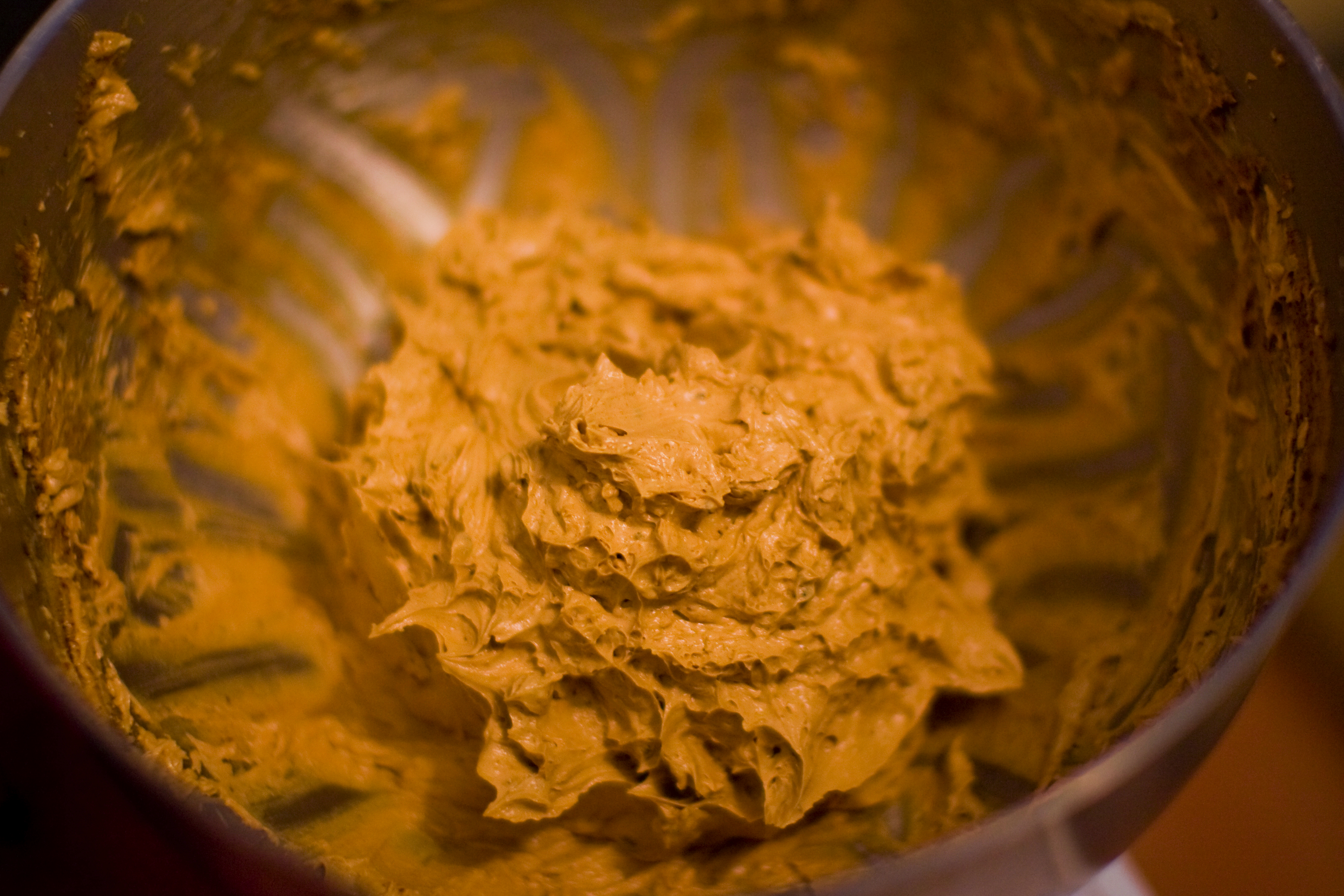
It's probably not that far from all cremes we make for eclairs and other desserts, although depending on booze might be more shelf stable.
3. Yan tan tethera pethera pimp
These are some familiar sounds but I didn;t know this is a legit counting system with various but still similar versions across the UK.
It’s an old counting system used traditionally by shepherds in parts of the UK, and also in knitting and fishing and so on, or by children for their own amusement.
How did it travel all the way to my home town, that is the question.
4. Bridie
I was looking for an early mornnig snack in Inverness and found out about those authentic hand pies from some Google Maps review.
The filling of a bridie consists of minced steak, butter, and beef suet seasoned with salt and pepper. It is sometimes made with minced onions. Before being baked, the bridie's filling is placed on pastry dough, which is then folded into a semi-circular shape; finally, the edges are crimped. If the baker pokes one hole in the top of a bridie, this indicates that it is plain, or without onions; two holes means that it does contain onions, a convention which is applied also to a Scotch pie.
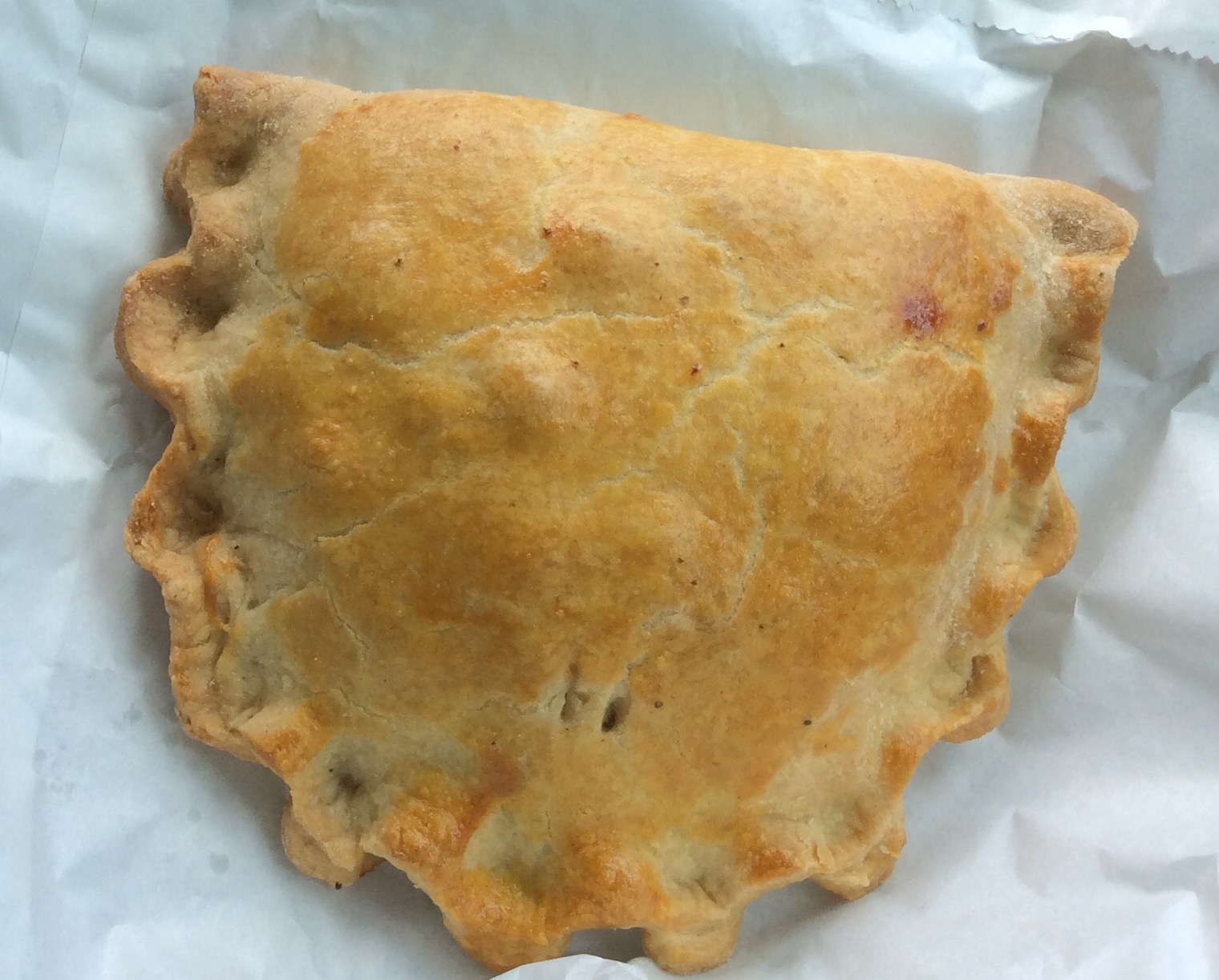
The main takeaway here is that number of dots might actually shed some light on the insides, but that just sounds terribly unreliable.
5. Turing's "Paper Machine"
There were plenty of attempts to code a chess playing engine without a real human hidden inside, and while nowadays it's more or less solved, it wasn't as straightforward without a computer at hand.
At the time there was no machine, of course, that could execute this set of instructions, and so Turing acted as a human CPU, using paper and pencil, requiring more than half an hour to calculate each move. He played a game against Champernowne's wife, who was a beginner at chess, and won.
There is the actual algorithm behind the link, and it seems really straightforward but covers most of positions and scenarios well, so the whole system feels like an odd alphabet for a weird language, not a table game.
6. Romeritos
Looks like a stew with Christmas tree but that's just a rosemary sibling.
Romeritos is a Mexican dish from Central Mexico, consisting of tender sprigs of seepweed (Suaeda spp.) which are boiled and served in a mole sauce seasoned with shrimp jerky blended into the mix.

Moly with dried shrimps sounds pretty cool though.
7. When (if ever) did the Sun finally set on the British Empire?
Some empires of the past are described with words "the empire on which the sun never sets", and the British Empire still stands true to the definition.
The Sun never sets on all fourteen British territories at once (or even thirteen, if you don’t count the British Antarctic Territory). However, if the UK loses one tiny territory, it will experience its first Empire-wide sunset in over two centuries.
I've heard a different version of the saying though, that ends with "because even God won't trust the English in the dark".
8. Struffoli
This looks like a great holiday dessert to make:
Struffoli also known as Honey Balls is a Neapolitan dish made of deep fried balls of sweet dough.
Such a shame I can really look and sweets anymore (it the holidays just started!).
9. Royal Albert Hall's roof is not attached to the rest of the building
We've been to RAH some time ago but I only recently learnt that its roof is not screwed to the rest of the building.
The roof simply sits on top - it is not attached to the Hall building in any way. When it was put in place, the weight of the roof caused the Hall to sink by just under a millimetre. It remains a sturdy construction after 150 years - the roof of the Royal Albert Hall is able to withstand the weight of up to 158 tonnes of snow on a particularly wintery day.
Not sure what impresses me most; someone's persuasion skills or the fact that all that glass and steel might fall down on both visitors and performers.
10. Mithras in Britain
In the Roman times some folks used to worship a god who sounds very similar to Jesus Christ, and even had quite a few altars here in the UK.
Mithras, who was a god of friendship, contract, and order, started out as an Indo-Iranian deity, and once Rome conquered Iran, spread very quickly throughout the Roman Empire. Mithraism is described by scholars as a ‘mystery’ cult because worship of Mithras was secretive and involved seven degrees of initiation, each of which required the initiate to perform a task.
The origins are not even Roman though, so it might have traveled rather far to reach our shores. Sounds like an odd off-sequel to American Gods (which I'd definitely watch).
Book of the week
I'd love to cook more unfamiliar dishes, but that's often a chicken-and-egg problem: making something you've never tried before is dangerous, as if you are not happy with the outcome it might make you avoid the dish in question in the future, even if it's just a bad recipe or bad luck.
One of those cuisines I could focus on more often is the Middle Eastern one, and while I've already looked into Palestinian mains, there are also lots of sweets I either never tried or can't even imagine making yet.
Salma Hage's Middle Eastern Sweets book helps with exactly that: bothe exploring and understanding the science behind pretty much everything from small sesame shortbreads to 1000-hole pancakes to orange and pistachio Turkish Delights.
I struggle to think of any sweet scents more evocative of my childhood than those of orange blossom and rose waters. These fragrant waters are in fact by-products of the distillation of rose and orange flower petals for their essential oils, and are used to flavor syrups and permeate their delicate aroma through batters and fillings, giving a distinctive taste of the pastry counters and cake stands of the Middle East, as well as the flaky pastries served in homes to mark the end of a meal. The aroma is so appealing, exotic, and has the potency to transform the humblest of sponges into a regal cake, fit for the most special guests around the table. Often the flavor is described as bitter, which is fitting, as they are used in some of the most sugary syrups and pastries to cut through the sweetness. Trade routes brought orange blossom and rose waters to European kitchens and courts in the Middle Ages, where they were first used to mask unpleasant smells, to wash hands before eating and to strengthen organs. Subsequently, flower waters became more common as culinary ingredients to flavor fruit-based desserts, almond cakes, and French delicacies, such as madeleines and canelés.
Out of all those sweets though, Bakhlava is probably my Northern star. I've tried it lots of times, and yet never attempted to cook myself. Sounds like a good way to start 2023.
Thank you and see you in a week
(or in a month)!
If you want to receive the newsletter on a weekly basis and support it, please consider subscribing to the weekly plan.
If you have any questions or suggestions for the next newsletter, you can send me a message on Twitter (@Valzevul) or reply to this email.
Note that if you do not subscribe to the weekly plan, you will continue to receive the newsletter on a monthly basis without needing to do anything.Cheers! 🍸
Older messages
Tuesday Triage #124
Wednesday, November 30, 2022
Your weekly crème de la crème of the Internet is here! The 124th edition featuring Ayahuasca side-effects, the Potato Paradox, and a fake Martin Scors
Tuesday Triage #120
Wednesday, November 2, 2022
Your weekly crème de la crème of the Internet is here! The 120th edition featuring onion snow, walking streetlamps, and Woodcock toasts.
Tuesday Triage #116
Wednesday, October 5, 2022
Your weekly crème de la crème of the Internet is here! The 116th edition featuring Hallgrímskirkja, God's own country, and jagua.
Tuesday Triage #112
Tuesday, September 6, 2022
Your weekly crème de la crème of the Internet is here! The 112th edition featuring Turkey Twizzlers, Stracciatella, and osmotolerant yeast.
Tuesday Triage #108
Tuesday, August 9, 2022
Your weekly crème de la crème of the Internet is here! The 108th edition featuring gesti famosi, Ejection Tie club, and a French focaccia.
You Might Also Like
Edge 460: Anthropic's New Protocol to Link AI Assistants to Data Sources
Thursday, December 26, 2024
Model Context Protocols is one of the recent AI contributions of the AI lab. ͏ ͏ ͏ ͏ ͏ ͏ ͏ ͏ ͏ ͏ ͏ ͏ ͏ ͏ ͏ ͏ ͏ ͏ ͏ ͏ ͏ ͏ ͏ ͏ ͏ ͏ ͏ ͏ ͏ ͏ ͏ ͏ ͏ ͏ ͏ ͏ ͏ ͏ ͏ ͏ ͏ ͏ ͏ ͏ ͏ ͏ ͏ ͏ ͏ ͏ ͏ ͏ ͏ ͏ ͏ ͏ ͏ ͏ ͏ ͏ ͏ ͏
December 26th 2024
Thursday, December 26, 2024
Curated news all about PHP. Here's the latest edition Is this email not displaying correctly? View it in your browser. PHP Weekly 26th December 2024 Hi everyone, It's boxing day in some parts
Re: This took me 10 minutes and protects my privacy
Thursday, December 26, 2024
Christmas may be over, but you still have one more chance to take advantage of Incogni's amazing holiday promotion! Protect your personal data from hackers and scammers today with Incogni's 58%
Daily Coding Problem: Problem #1648 [Medium]
Wednesday, December 25, 2024
Daily Coding Problem Good morning! Here's your coding interview problem for today. This problem was asked by Quora. Given an absolute pathname that may have . or .. as part of it, return the
🎮 The Best Games to Go With Your New Console — Streaming Services Could Learn From YouTube
Wednesday, December 25, 2024
Also: Don't Throw Christmas Gift Boxes on the Curb, and More! How-To Geek Logo December 25, 2024 Did You Know Years before The Nightmare Before Christmas, Tim Burton was sprinkling references to
Charted | Global Economic Confidence in 2025, by Country 🌎
Wednesday, December 25, 2024
While emerging markets in Asia have the strongest confidence in the global economy looking ahead, European countries are most pessimistic. View Online | Subscribe | Download Our App FEATURED STORY
Top Tech Deals 🎅 Sony Headphones, iPhone Cases, 4K Projector, and More!
Wednesday, December 25, 2024
The season of giving is upon us. How-To Geek Logo December 25, 2024 Top Tech Deals: Sony Headphones, iPhone Cases, 4K Projector, and More! The season of giving is upon us. Happy Holidays! If you're
Why the Race to AGI is Humanitys Defining Moment
Wednesday, December 25, 2024
Top Tech Content sent at Noon! Boost Your Article on HackerNoon for $159.99! Read this email in your browser How are you, @newsletterest1? 🪐 What's happening in tech today, December 25, 2024? The
Iran's Charming Kitten Deploys BellaCPP: A New C++ Variant of BellaCiao Malware
Wednesday, December 25, 2024
THN Daily Updates Newsletter cover The Data Science Handbook, 2nd Edition ($60.00 Value) FREE for a Limited Time Practical, accessible guide to becoming a data scientist, updated to include the latest
Software Testing Weekly - Issue 251
Wednesday, December 25, 2024
GitHub Copilot is free! 🤖 View on the Web Archives ISSUE 251 December 25th 2024 COMMENT Welcome to the 251st issue! In case you missed it — GitHub Copilot is free! The free version works with Visual